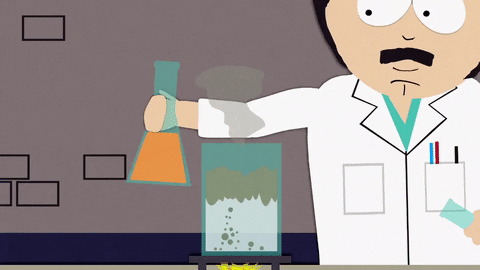
This logo isn't an ad or affiliate link. It's an organization that shares in our mission, and empowered the authors to share their insights in Byte form.
Rumie vets Bytes for compliance with our
Standards.
The organization is responsible for the completeness and reliability of the content.
Learn more
about how Rumie works with partners.
As soon as someone mentions the words "chemical engineer", what’s the first thing that pops up in your mind? Probably this:

Well, you're right to think that chemical engineers do work with chemicals, but that’s not the only thing they do.
What Do Chemical Engineers Do?
On any given day, a chemical engineer may be doing one or more of the following:
Innovating chemicals and chemical products, like making plastics from waste!
Designing industrial plants
Supervising plant operations
Troubleshooting issues during operations
Evaluating processes and suggesting improvements
Conducting risk analysis
Project management, including managing people, resources, and project deadlines
Yes! A chemical engineer does all that, so it's more than just working with chemicals.

Quiz
Which of the following is (are) true about the job duties of chemical engineers?
Chemical engineers are expected to perform varied job duites, ranging from innovating chemicals and chemical processes, ensuring industrial plants run smoothly, and all the way to managing people and resources. Therefore, in addition to knowing chemical processes, they must have sound mathematical knowledge, troubleshooting experience, and project management skills to perform a number of job duites.
Did you know?
How Do I Become A Chemical Engineer?
To get started as a chemical engineer, you're expected to have at least an undergraduate degree in Chemical Engineering. In addition to the degree, you need some skills too!
The following skills make you a good chemical engineer:
 Maths skills
Maths skills
 Design skills (to design plants, etc.)
Design skills (to design plants, etc.)
 IT skills, such as data analytics
IT skills, such as data analytics
 Analytical & creative mind
Analytical & creative mind
 Problem-solving ability
Problem-solving ability
 Commercial know-how of business
Commercial know-how of business
Quiz
Apart from a degree in Chemical Engineering, what will help you stand out in the field?
Chemical engineers are more than just an engineering specialists. They need to have a great mind for creativity and analysis, as well as problem-solving, design, and business skills.
Thinking About Potential Employers?
Pharmaceutical (such as, Moderna, Johnson & Johnson)
Oil & gas (such as, Shell, ExxonMobil)
Food processing (such as PepsiCo, Nestle)
Healthcare (such as, UHG, CignaCorp), and many more…
Once hired, you may be given an entry-level designation, such as Graduate Process Engineer, Process Engineer I, etc. As you progress in your role, you may be promoted to Process Engineer II, Lead Process Engineer, and so on.

Take Action

If chemical engineering resonates with you:
This Byte has been authored by
Vikas Sharma
Instructional Designer
 The median annual wage for chemical engineers in the US was $108,540 (approx. USD $50 per hour) in May 2020.
The median annual wage for chemical engineers in the US was $108,540 (approx. USD $50 per hour) in May 2020.  The median annual Chemical Engineer I salary in Canada is CAD $78,881, as of January 27, 2022
The median annual Chemical Engineer I salary in Canada is CAD $78,881, as of January 27, 2022